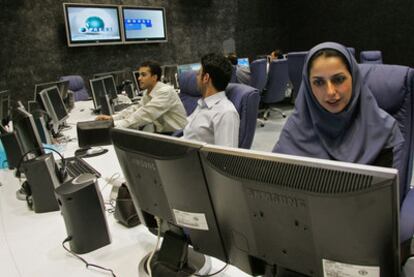Fresh chance in a chador
Iranian regime prepares launch of Spanish-language channel Hispan TV
María, a 24-year-old from Toledo, hopes to leave the unemployment line and soon appear on TV screens as a news anchor. To do so, she will have to don the chador, the cloak that partially covers women in Iran. María will be working out of Tehran for Hispan TV, the international Spanish-language information and entertainment channel that the Iranian regime plans to launch before year's end.
"This new channel in Spanish will play an essential role in reflecting the ideological legitimacy of our system in the world," stated earlier this month Ezatollah Zarqami, president of IRIB, the umbrella group for Iran's public television stations - the only ones allowed in the country. Since 2007, Iran has had its own world channel airing English-language information (Press TV) and two more in Arabic, Al Alam and iFilm.
"It's going to be quite an experience," says María, who previously interned at the private Spanish station Cuatro. For starters, she has had to get married, since Iranian authorities would not hear of her boyfriend coming along for more than the 15-day period allowed tourists unless they were legally wed.
Mohammed Sarafad, director of Hispan TV, was in Madrid last month to conduct interviews in English. Candidates who fit the bill, according to one young man who applied, were offered wages of around 2,000 euros a month, a small furnished apartment in Tehran, social security and transportation in the city.
Long before these interviews took place, Hispan TV asked several Spanish producers to send them some programming. David Tejera, a journalist at Cuatro, filmed 13 programs about movies while Rafael Luque, who had worked for the now-defunct CNN+, made programs about books. Needless to say, a religious program was also produced to disseminate the ideas of Shiite Islam, under the working title Diálogo abierto (Open dialogue). The production company Piruleta y Media, one of those involved, did not answer calls from this newspaper.
Mahmoud Alizadeh, who introduces himself as the man in charge of Hispan TV in Madrid, explains that "for a year we've been dubbing Iranian soaps and feature-length films in Spain in order to air them" on the new channel. Alizadeh has some experience in these matters, as years ago he translated the Royal Spanish Academy dictionary into Farsi.
The Iranian channel has also hired Latin American journalists, many of them women, and signed a deal with TeleSur, the Venezuelan news station. "We will have correspondents in all Latin American capitals and three in the US, in L.A., Miami and New York," says Alizadeh. Hispan TV will also have a bureau in Madrid.
Alizadeh, who lives in Madrid, trusts that Hispan TV will be on the air six hours a day by mid-November, expanding to 24-hour broadcasting two months later. He claims he does not know the budget that's been allotted to the channel, which will initially cover Europe and the Americas through the Spanish satellite Hispasat 1C.
In Iran, television is an ideological weapon. Proof of this lies in the fact that it remains under the direct control of the supreme leader, Ayatollah Ali Khamenei. One of its tasks, in fact, is to block the signals from the BBC and Voice of America in Farsi, as its president admitted in August 2010 during a talk with war veterans. That is why two Arab channels (Nile Sat and Arab Sat) refuse to accept signals from Al Alam, the Iranian channel in Farsi. Paradoxically, in Iran as in Cuba, it is forbidden to watch satellite TV, but many citizens have their own secret homemade dishes that can capture the forbidden signals.
Some monarchies in the Persian Gulf, which have their own broadcast empires, have also considered launching global stations in Spanish, but for now there are no concrete plans. The closest thing was Córdoba, a station for the dissemination of Islam that the Saudi sheikh Abdelaziz Al Fawzan attempted to launch in Andalusia in August 2010, but which was finally abandoned.

Tu suscripción se está usando en otro dispositivo
¿Quieres añadir otro usuario a tu suscripción?
Si continúas leyendo en este dispositivo, no se podrá leer en el otro.
FlechaTu suscripción se está usando en otro dispositivo y solo puedes acceder a EL PAÍS desde un dispositivo a la vez.
Si quieres compartir tu cuenta, cambia tu suscripción a la modalidad Premium, así podrás añadir otro usuario. Cada uno accederá con su propia cuenta de email, lo que os permitirá personalizar vuestra experiencia en EL PAÍS.
¿Tienes una suscripción de empresa? Accede aquí para contratar más cuentas.
En el caso de no saber quién está usando tu cuenta, te recomendamos cambiar tu contraseña aquí.
Si decides continuar compartiendo tu cuenta, este mensaje se mostrará en tu dispositivo y en el de la otra persona que está usando tu cuenta de forma indefinida, afectando a tu experiencia de lectura. Puedes consultar aquí los términos y condiciones de la suscripción digital.








































